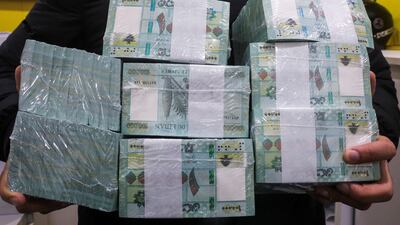The Association of Banks in Lebanon (ABL) said the country's agreement with the International Monetary Fund marks a “crucial first step” towards the country's economic recovery.
The Washington-based fund on Thursday agreed to offer about $3 billion to Lebanon as part of a four-year deal based on a comprehensive economic reform programme.
The IMF programme is the “only viable way out of the acute and unprecedented crisis and is vital to restore confidence and stop the haemorrhage of remaining reserves in the financial system”, ABL said in a statement on Friday.
“We would like to congratulate the government for the efforts exerted to reach this important milestone.”

Lebanon's economy contracted about 58 per cent between 2019 and 2021, with gross domestic product plummeting to $21.8bn last year from about $52bn in 2019, World Bank figures show — the largest contraction on a list of 193 countries.
The collapse occurred after the country defaulted on about $31bn of Eurobonds in March 2020, with its currency sinking more than 90 per cent against the dollar on the black market and inflation rising to triple digits.
Delay in dealing with the crisis has increased the financial gap by an estimated $35bn, ABL said.
“Since the beginning of the crisis, the financial gap has been increasing at an alarming rate mostly driven by the subsidy schemes and market interventions to procure the hard currency for imports and FX conversions,” ABL said.
“We stress the importance of time in securing all the required reformist legislation and approvals to enable the full implementation of the IMF programme, including but not limited to the long overdue capital controls law, a macroeconomic and debt sustainability strategy and governance reforms.”
The Extended Fund Arrangement announced on Thursday, which is subject to IMF management and executive board approval, aims to “rebuild the economy, restore financial sustainability, strengthen governance and transparency, remove impediments to job-creating growth, and increase social and reconstruction spending”, the fund said.
The plan involves improving public finances and reducing public debt through revenue-generating and administrative reform measures to ensure a more equal and transparent distribution of the tax burden.
Confidence in the country's banking system and lenders who had traditionally been the backbone of the economy and helped various governments fund fiscal and current account deficits eroded as a liquidity crunch, shortage of dollars and informal capital control measures set in once the economic crisis unfolded.
The fund stressed that the “health and viability of the financial sector will need to be restored for the country to be able to lift the existing uncertainty and provide conditions for strong economic growth".
“Total recapitalisation needs in the banking system are very large, and losses will need to be recognised upfront and allocated, while protecting small depositors. An appropriate strategy has been designed, but its implementation requires a number of legislative changes to support it.”
The banking sector “was and will remain the engine of growth and one of the pillars of the Lebanese economy”, the ABL said.
“The banking sector remains open to any solution that resolves the crisis … The real work starts now, and the test will be in the implementation of the ambitious and heavy sets of outlined reforms.”


